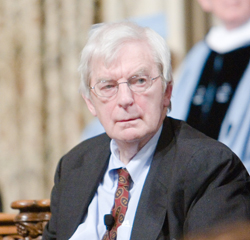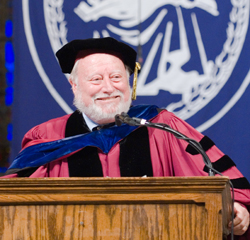Graduates, Engage!
Each of the three recipients at convocation of the TC Medal for Distinguished Service reminded the new graduates of their obligation to give back to society.
Lee Shulman, President of the Carnegie Foundation for the Advancement of Teaching, addressed the graduates on what it means to be a "master" -- a term that, rather than signifying command, was first used to designate those who have achieved "the highest level of understanding, allowing them to learn and teach someone else."
And further obligations, Shulman said, include the four "Hs" he learned years ago from a
Shirley Ann Jackson, theoretical physicist and President of Rensselaer Polytechnic Institute, said that the aims of education "are to enable and to serve," and urged the graduates to "think about and to appreciate the personal resources you have -- your roots and heritage, your unique experiences and perspectives" because "they make you exceptional, inimitable and, above all, uniquely valuable."
Jackson called for a greater emphasis on "diversity-enhanced education," which she described as having four basic elements: a diversity of approach that stresses working across disciplines; a diversity of pedagogy, "where education is enhanced and expanded through the utilization of a variety of new media and tools"; a diversity of outlook, "where students are exposed to diverse cultures and lifestyles-' to acquire a grounding in fundamentals, but, in addition, multicultural sophistication, a global perspective and intellectual agility"; and a diversity in fact, "where all of our young people of diverse ethnicities and backgrounds are encouraged and inspired to achieve at the highest levels.
"You have a unique opportunity, in your educational practice, in your research, and in the development and implementation of policy to make diversity-enhanced education a reality for all children,"
In an emotionally charged appearance that brought the audience to its feet, TC Professor Emeritus Thomas Sobol, the former New York State Commissioner of Education, described what he called "a few defining moments of my career and the lessons I have taken from them."
During the unrest of the 1960s and 70s, as Assistant Superintendent of Schools in Great Neck, New York and Superintendent of Schools in Scarsdale New York, Sobol said he found himself caught between the students who were conducting demonstrations, marches, teach-ins and the occupying of administrative offices, and the boards of education, who "by and large were appalled by this behavior" and "wanted order to be restored."
Ultimately he chose the students, Sobol said, arranging for student delegates to be named to the education boards, sponsoring teach-ins on controversial subjects and staging a strike in the high schools the day after the killing of students at
"But our greatest accomplishment was to plan and see into operation two -'alternative schools," Sobol said -- schools that, though initially designed to be responsive to the political and social conditions of the time, remain active today and still inspire some advocates of high school reform."
Sobol faced a second defining moment in 1987 as
Sobol responded by meeting with minority groups and ultimately commissioning their leaders to conduct a report on the state's curriculum materials.
When the report was submitted, it was so scathing that one of Sobol's two chief deputies, who was white, advised him to quietly bury the document, arguing that if he didn't, there would be such an outcry that it would crush the office's new agenda to help poor students.
The other deputy, who was black, said he agreed with the first deputy's analysis, but not his recommendation. He urged Sobol to accept the report in public and "live with the consequences."
Sobol followed the second deputy's advice. The first deputy proved right -- "all hell broke loose," Sobol said -- and ultimately the initiative proposed by the report failed.
"Some friends see it differently," Sobol said. "They believe that the public debate was informative and had prepared the way for future ventures. I think it may be so, but I'm not sure."
The third defining moment came when the Campaign for Fiscal Equity, a coalition of parents, teachers and community advocates, sued
"Throughout my years of service I had consistently argued that more of the wealth of the state should be devoted to the education of poor children," Sobol said. "How could I, as defendant at trial, suppress the principles I adhere to and deny the facts that I witnessed?"
The request was denied, but he ultimately was allowed to testify as amicus witness. The CFE won the case and billions of additional dollars for city schools.
"I take no credit for this decision," Sobol said. "The outcome would not have changed wherever I sat around the table. But I feel clean."
Among the lessons he learned from these experiences, Sobol said, are that defining moments do occur and have a lasting impact on the individual they define; that not all defining moments are success stories; and that such moments only come about as a result of personal initiative that requires courage.
He closed with an exhortation to engage with other human beings, quoting the poet May Sarton:
"The faultless crystal of detachment
Comes after, cannot be created
Without the first intense attachment
Even the saints achieve this slowly
For us, more human and less holy
In time like air is essence stated."
Published Friday, May. 18, 2007


